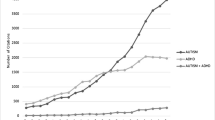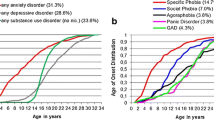Opinion statement
Pervasive developmental disorders (PDDs), including autistic disorder (autism), Asperger’s disorder, and pervasive developmental disorder not otherwise specified (PDD NOS), are neurodevelopmental disorders of childhood onset. These disorders persist throughout the lifespan of affected individuals and are characterized by impaired social behavior and communication, along with repetitive, stereotypic behaviors. Early diagnosis and subsequent behavioral therapy have been shown to improve outcomes for these individuals. Risperidone and aripiprazole have been approved by the United States Food and Drug Administration (FDA) for treatment of irritability associated with autism in children and adolescents. Despite their efficacy, use of these medications is limited by their side effects. In individuals with severe irritability, the first-line treatment is often risperidone. Because of its relatively lower risk of weight gain and metabolic side effects, aripiprazole may be used initially if there is a personal or family history of obesity or diabetes. Monitoring of body mass index and metabolic profiles is indicated with both medications. Stereotypic behaviors associated with autism, though clearly driven by neurobiologic processes, can also be understood as coping mechanisms used to decrease anxiety. From this perspective, therapies targeting reduction of these symptoms may be contraindicated. However, when these symptoms are severe and interfering, pharmacotherapy may be necessary. Serotonin reuptake inhibitors are of limited efficacy in children and adolescents, but risperidone and aripiprazole have been shown to reduce these symptoms. There remains a need for further safety and efficacy research in this area. Hyperactivity and inattention are currently treated with a variety of medications, including guanfacine, which has a relatively benign side effect profile. Stimulant medications are generally avoided as first-line treatment for hyperactivity because of concerns about increased irritability. Currently, social impairment is best addressed through behavioral therapy and social skills training. Novel pharmacotherapies to improve social impairment are in the early stages of research.
Similar content being viewed by others
References and Recommended Reading
Papers of particular interest, published recently, have been highlighted as: • Of importance•• Of major importance
Kanner L: Autistic disturbances of affective contact. J Nerv Child 1943, 2:217–250.
American Psychiatric Association: Diagnostic and Statistical Manual of Mental Disorders, edn 4th. Washington DC: American Psychiatric Press; 1994.
Howlin P, Magiati I, Charman T: Systematic review of early intensive behavioral interventions for children with autism. Am J Intellect Dev Disabil 2009, 114(1):23–41.
Research Units on Pediatric Psychopharmacology Autism Network: Randomized, controlled, crossover trial of methylphenidate in pervasive developmental disorders with hyperactivity. Arch Gen Psychiatry 2005, 62(11):1266–1274.
Scahill L, Aman MG, McDougle CJ, et al.: A prospective open trial of guanfacine in children with pervasive developmental disorders. J Child Adolesc Psychopharmacol 2006, 16(5):589–598.
Handen BL, Sahl R, Hardan AY: Guanfacine in children with autism and/or intellectual disabilities. J Dev Behav Pediatr 2008, 29(4):303–308.
Physicians Desk Reference online. Available at http://www.pdr.net/home/pdrHome.aspx. Accessed May 2010.
Arnold LE, Aman MG, Cook AM, et al.: Atomoxetine for hyperactivity in autism spectrum disorders: placebo-controlled crossover pilot trial. J Am Acad Child Adolesc Psychiatry 2006, 45(10):1196–1205.
Posey DJ, Wiegand RE, Wilkerson J, et al.: Open-label atomoxetine for attention-deficit/ hyperactivity disorder symptoms associated with high-functioning pervasive developmental disorders. J Child Adolesc Psychopharmacol 2006, 16(5):599–610.
Stahl SM: Essential Pharmacology The Prescriber’s Guide. Revised and Updated Edition. New York: Cambridge University Press; 2006.
McDougle CJ, Naylor ST, Cohen DJ, et al.: A double-blind, placebo-controlled study of fluvoxamine in adults with autistic disorder. Arch Gen Psychiatry 1996, 53(11):1001–1008.
Hollander E, Phillips A, Chaplin W, et al.: A placebo controlled crossover trial of liquid fluoxetine on repetitive behaviors in childhood and adolescent autism. Neuropsychopharmacology 2005, 30(3):582–589.
Autism Speaks Announces Results Reported for the Study of Fluoxetine in Autism (SOFIA), First Industry-Sponsored Trial for the Autism Clinical Trials Network (ACTN) 2009. New York, NY: Autism Speaks; February 18, 2009. Available at http://www.autismspeaks.org/press/as_announces_sofia_results.php. Accessed May 2010.
King BH, Hollander E, Sikich L, et al.: Lack of efficacy of citalopram in children with autism spectrum disorders and high levels of repetitive behavior: citalopram ineffective in children with autism. Arch Gen Psychiatry 2009, 66(6):583–590.
Research Units on Pediatric Psychopharmacology Autism Network: Risperidone in children with autism and serious behavioral problems. N Engl J Med 2002, 347(5):314–321.
Marcus RN, Owen R, Kamen L, et al.: A placebo-controlled, fixed-dose study of aripiprazole in children and adolescents with irritability associated with autistic disorder. J Am Acad Child Adolesc Psychiatry 2009, 48(11):1110–1119.
Owen R, Sikich L, Marcus RN, et al.: Aripiprazole in the treatment of irritability in children and adolescents with autistic disorder. Pediatrics 2009, 124(6):1533–1540.
Research Units on Pediatric Psychopharmacology Autism Network: Risperidone treatment of autistic disorder: longer-term benefits and blinded discontinuation after 6 months. Am J Psychiatry 2005, 162(7):1361–1369.
Komossa K, Rummel-Kluge C, Schmid F, et al.: Aripiprazole versus other atypical antipsychotics for schizophrenia. Cochrane Database Syst Rev 2009, 4:CD006569.
Posey DJ, Kem DL, Swiezy NB, et al.: A pilot study of D-cycloserine in subjects with autistic disorder. Am J Psychiatry 2004, 161(11):2115–2117.
Posey DJ, Stigler KA, Erickson CA, et al.: A double-blind placebo-controlled study of D-cycloserine in children with autistic disorder [abstract P3.53:83]. Presented at the 55th Annual Meeting of the American Academy of Child and Adolescent Psychiatry Scientific Proceedings, Chicago, IL; October 29–November 1, 2008.
Erickson CA, Posey DJ, Stigler KA, et al.: A retrospective study of memantine in children and adolescents with pervasive developmental disorders. Psychopharmacology (Berl) 2007, 191(1):141–147.
Chez MG, Burton Q, Dowling T, et al.: Memantine as adjunctive therapy in children diagnosed with autistic spectrum disorders: an observation of initial clinical response and maintenance tolerability. J Child Neurol 2007, 22(5):574–579.
Macdonald K, Macdonald TM: The peptide that binds: a systematic review of oxytocin and its prosocial effects in humans. Harv Rev Psychiatry 2010, 18(1):1–21.
Hollander E, Bartz J, Chaplin W, et al.: Oxytocin increases retention of social cognition in autism. Biol Psychiatry 2007, 61(4):498–503.
Andari E, Duhamel JR, Zalla T, et al.: Promoting social behavior with oxytocin in high-functioning autism spectrum disorders. Proc Natl Acad Sci USA 2010, 107(9):4389–4394.
Acknowledgments
Dr. Erickson’s work is supported in part by The Division of Disability & Rehabilitative Services, Indiana Family and Social Services Administration; and National Institutes of Health grant K12 UL1 RR025761 Indiana University Clinical and Translational Sciences Institute Career Development Award. Dr. McDougle’s work is supported in part by The Division of Disability & Rehabilitative Services, Indiana Family and Social Services Administration; and NIMH grants R01 MH072964 and R01 MH077600.
Disclosure
Dr. Erickson receives consulting fees from Novartis, F. Hoffman-LaRoche, and McNeil Pediatrics, and research grant support from F. Hoffmann-LaRoche and Seaside Therapeutics. Dr. McDougle is a consultant to Bristol-Myers Squibb, receives grant support from that company, and serves on its Speakers Bureau. No other potential conflicts of interest relevant to this article were reported.
Author information
Authors and Affiliations
Corresponding author
Rights and permissions
About this article
Cite this article
Wink, L.K., Erickson, C.A. & McDougle, C.J. Pharmacologic Treatment of Behavioral Symptoms Associated With Autism and Other Pervasive Developmental Disorders. Curr Treat Options Neurol 12, 529–538 (2010). https://doi.org/10.1007/s11940-010-0091-8
Published:
Issue Date:
DOI: https://doi.org/10.1007/s11940-010-0091-8




